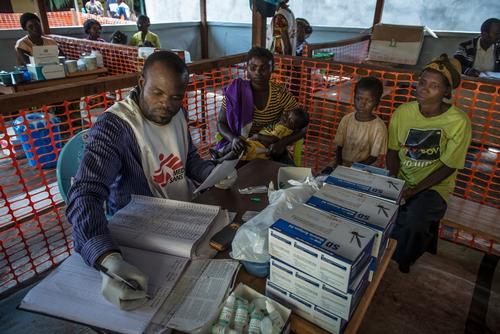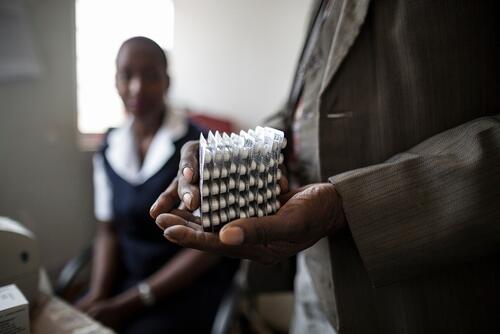First published in MSF's International Activity Report 2014, available to download below.
Contributors: Rony Zachariah, Tony Reid, Nathan Ford, Eric Goemaere, Marc Biot, Tom Ellman, Roger Teck, Wilma van den Boogaard, Engy Ali, Marcel Manzi, Rafael Van den Bergh, Petros Isaakidis, Mohammed Khogali, Walter Kizito, Tom Decroo, Laura Bianchi, Paul Delaunois, and Bertrand Draquez.
How is operational research defined?
From an MSF perspective, a pragmatic definition of operational research is “the search for knowledge on interventions, strategies and tools that can enhance the quality or performance of programmes”.
Broadly speaking, operational research is the ‘science of doing better’ and often it is about showing ‘what works’ and ‘what does not work’ in the contexts where we have projects in order to advocate for change in a scientifically credible manner.
What can operational research achieve?
There are many stories illustrating the start of operational research in MSF, but perhaps the most powerful are linked to our early struggles in sub-Saharan Africa with malaria and HIV/AIDS.
Malaria
In a hospital outpatient clinic in Mali in the 1990s, doctors treating malaria patients gave a prescription for chloroquine to a man who complained that he had already taken the drug several times in the past and it had not worked. He asked for an alternative.
At the time though, MSF was applying national protocols based on WHO recommendations and chloroquine was the only medicine available.
National and international authorities considered the available evidence of chloroquine resistance to be insufficient to justify the economic consequences of changing to more effective but costlier treatments. Evidence needed to be gathered to prove that chloroquine was not working.
MSF and one of its research arms – Epicentre – undertook efficacy studies in collaboration with health ministries in the early 2000s to evaluate national protocols.
The patient was proved correct – chloroquine treatment had a failure rate of up to 91 per cent for Plasmodium falciparum malaria, which is one of the most common and the most deadly form of the disease. Now guidelines could be changed and alternatives implemented.
By giving this example, we are not seeking to blame clinicians, who do the best they can with limited resources. The story simply illustrates why operational research is a vital component in evaluating a programme, and why it should be a routine part of any project cycle.
A culture of inquiry, combined with the application of scientific methods and peer-reviewed publications, is essential for advocacy, to show ‘what works’ and ‘what does not work’, and to find practical solutions.

HIV/AIDS
In the late 1990s and early 2000s, MSF witnessed first hand the toll HIV and AIDS was taking on communities in lower-income countries, and there was much internal debate about whether or not MSF should get involved with potentially lifesaving antiretroviral (ARV) treatment provision.
Western governments considered that ARVs were too complex and too expensive (US$10,000–15,000 per patient per year at the time) and that Africa should focus on other health priorities.
This was at a time when more than 25 million people in sub-Saharan Africa were infected with HIV/AIDS, over 17 million had already died and many countries in the region had been brought to their knees due to HIV/AIDS-related illnesses and deaths.
The real problem for some, however, was perception. To give an extreme example, Andrew Natsios, the head of the United States Agency for International Development during the George W. Bush administration, argued against funding ARVs in Africa in an interview with the Boston Globe in June 2001.
He said: “The problems extend to the Africans themselves. They do not know what watches and clocks are … they don’t know what Western time is. You have to take these drugs at certain hours each day, or they don’t work. And if you say, one o’clock in the afternoon, they don’t know what you are talking about.”
Needless to say, his argument was roundly rejected and some called for his immediate resignation. The role of operational research in all this was to provide proof to people who thought as he did that they were wrong.
Research conducted by MSF in Uganda, Kenya, South Africa, Malawi and Thailand played a historical role in demonstrating the feasibility and effectiveness of HIV treatment in resource-limited settings. It also showed that access to ARVs could transform HIV/AIDS from a death sentence into a manageable chronic disease.
MSF advocacy, in close collaboration with activist organisations for ARV price reductions (the price is now close to US$70 per patient per year), spearheaded by operational research, made pivotal contributions in steering the political momentum towards a global increase in ARV provision.
Why is operational research relevant for MSF?
Operational research allows MSF to improve programme performance, help patients, assess the feasibility of new strategies and/or interventions and advocate policy change.
It also makes MSF accountable to its patients, its donors and itself, and consequently challenges the ‘business as usual’ approach.
Furthermore, operational research leads to improved medical/scientific visibility and credibility, raises awareness of the scientific literature among field staff and facilitates networking and partnerships with other organisations.
It also brings synergistic improvements to data collection, monitoring and feedback, which is vital for credible medical témoignage. Operational research using project data acts thus as a scientific ‘witness’.
To what extent has the MSF Movement embraced this science?
MSF has become an important international contributor to health research through the expansion of its research activities. This is reflected in the number of peer-reviewed publications in which MSF work has featured, which has increased from barely five, mainly focused on HIV/AIDS, in 2000, to more than 150 covering a range of subjects in 2014.
Since 2010, the MSF Field Research website, which archives MSF-authored publications and makes them available for free, has had 430,000 downloads from around the world.
The world seems to be increasingly interested in the operational research work done by MSF and we are clearly providing information that people are actively seeking.
MSF has created operational research fellowships, participated in international scientific conferences, established an Ethics Review Board, developed an institutional position on supporting open (free) access to publications, launched an innovation fund and set up research registries.
MSF has also been a pioneering partner in developing a WHO-accredited course that is seen as a blueprint for increasing operational research in 70 low- and middle-income countries.
This intervention should result in more relevant operational research being conducted, better implementation of health programmes and ultimately, more lives saved.
Integrating operational research into its operations has helped MSF to improve programme effectiveness, provided evidence for advocating on behalf of patients at risk and contributed to the growth of research capacity worldwide.
Rather than a luxury, operational research undertaken by MSF units such as LuxOR (Luxembourg), SAMU (South Africa), the Manson Unit (United Kingdom), Epicentre (France) and BRAMU (Brazil) is a vital component of effective humanitarian aid.
Three examples of operational research studies published by MSF and their contributions to policy and practice
| Operational research study | Main findings | Effect on policy and practice |
|---|---|---|
| 'Improving performance of medical interventions' Tayler-Smith K, Zachariah R, Hinderaker SG, Manzi M, De Plecker E, Van Wolvelaer P, et al. Sexual violence in post-conflict Liberia: survivors and their care. Trop Med Int Health. 2012; 17(11): 1356-60. |
The care package focused only on women and was not adapted to the context where sexual violence also affected minors and men. | Liberia’s national guidelines and MSF’s were revised. |
| 'Assessing feasibility of interventions in specific populations' O'Brien DP, Sauvageot D, Zachariah R, Humblet P. In resource-limited settings good early outcomes can be achieved in children using adult fixed-dose combination antiretroviral therapy. AIDS. 2006; 20(15): 1955-60. |
Integrated ARV treatment can be offered in a conflict setting with good outcomes. |
Provided knowledge on how to *Benchmark guidelines for offering health services for refugees and displaced populations. |
| 'Advocating for policy change' Guthmann JP, Checchi F, van den Broek I, Balkan S, van Herp M, Comte E, et al. Assessing antimalarial efficacy in a time of change to artemisinin-based combination therapies: the role of Médecins Sans Frontières. PLoS Med. 2008; 5(8): e169. |
High levels of drug resistance in falciparum malaria and ineffective national regimens in 18 countries. | Led to a shift in national and international policy on use of more effective antimalarial treatment. |



